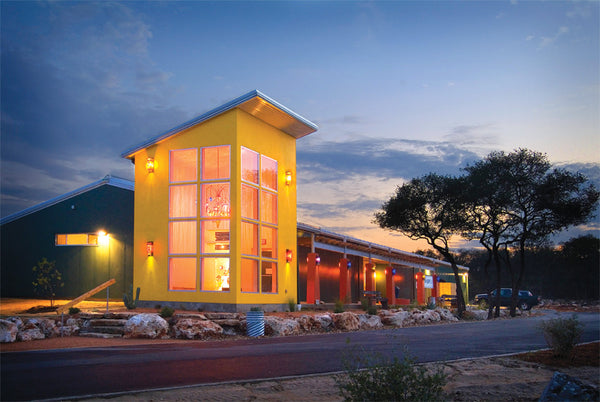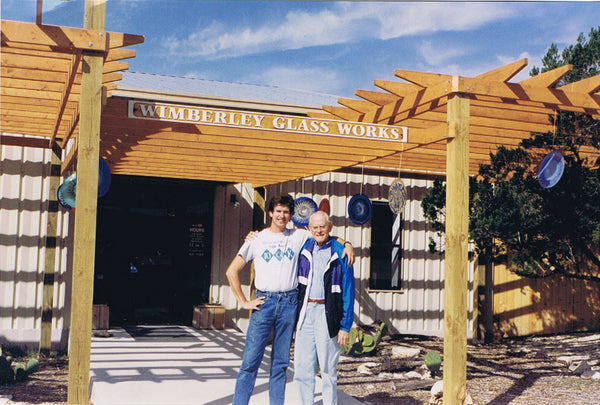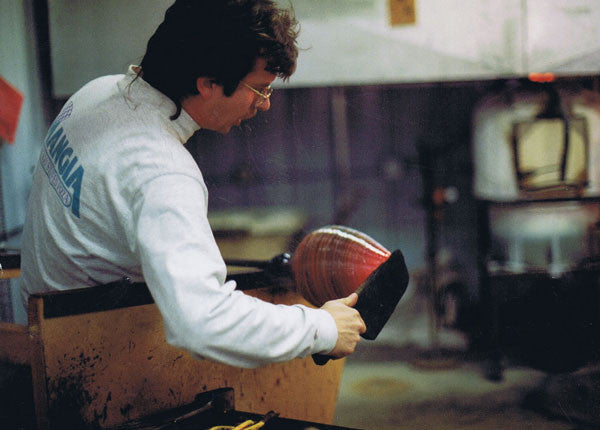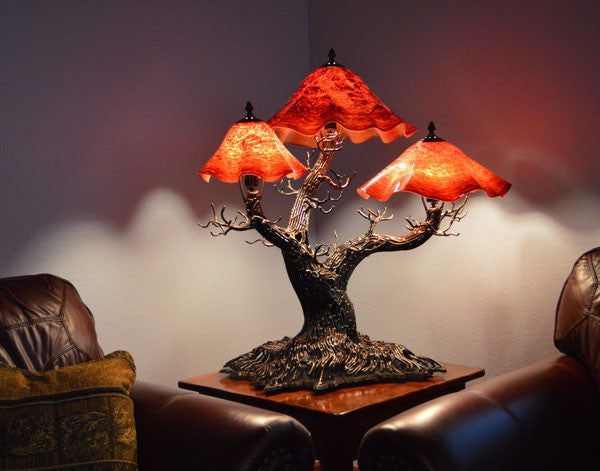25 Years in the Making: The Story of Wimberley Glassworks
On June 3, 2017 Wimberley Glassworks will celebrate 25 years of showing guests how the ancient art of glass blowing is done. During that time, the studio has grown from a one man operation to employing 11 people and moved to a larger building, built specifically for the Glassworks.

“You shouldn't think I've made all the right choices,” says Tim De Jong, owner of Wimberley Glassworks. “When I fall, I fall hard, because I take big risks.”

One such risk was when he was breaking into commercial work for large scale art installations. He underbid his competitors by a lot. In fact, too much.
Luckily, the company he was doing the work for recognized that. They called him out on it, and suggested he invoice them for the difference. “We want you to stay in business so you can work for us again,” he told de Jong. Not making the same mistake twice, the Glassworks now has installations throughout the nation.
Blowing glass is very difficult, demanding and physically challenging art. It can take years to learn the skills necessary to combine elements, shape and mold the glass to get just the right size and shape. It did not come easily to de Jong.

“Glass is a sensual, sexy, seductive material. Everyone wants to touch it, and everyone is afraid to touch it,” de Jong says. “When you make a glass piece, you can't just go in and make a glass piece. I haven't made a piece without putting one hundred percent of my heart into it. You just can't work the material without pouring your soul into it.”
A walk through the showroom is a glimpse into the soul of the artists who work the glass.
“How do we stay exciting, how do we stay cutting edge?” de Jong poses the question and then answers, “The answer is synergy. One plus one equals three. One person's idea you combine with another person's idea and you get a third idea.”
He includes everyone who works there on design discussions. He values everyone's input.

De Jong credits his father, who was a part of the Dutch underground in World War II, with instilling in him the determination to survive when things got tough. He tells a story of an encounter just after he finished high school. He came to his father and told him he did not want to go to college. His father looked at him and said, “I will have to think about that, and I will get back to you.”
A few days later de Jong's father presented him with $300 cash and a one-way ticket to Seattle, Washington (they lived in New Jersey). He told him "work your way home...if you don't want to go to college we'll talk!
Taking his father's challenge, he worked his way back, at one point sleeping under the Congress Avenue bridge in Austin for a while, which is when he first fell in love with this area of the country and vowed to return. It took him about four and a half months to get all the way back home, working some really miserable jobs. After that summer the choice to attend college was a simple one.
It was then he decided to go to art school. He attended Alfred University, in Alfred, New York, a small town in the southwest corner of New York state. He first got the idea for working with glass and lighting from visiting the Niagara Falls in the winter. The build up of ice hanging off the light posts reflecting the setting sun captivated his imagination, which soon developed into art glass lighting designs.
The three lessons he took from the cross country challenge were the knowledge of where absolute bottom is, knowing how far he could push himself until he fell and that if he fell he knew he could get back up and get on with it.
In fact, de Jong says he became a risk taker as a result of this experience. In an odd way, fear became his barometer. If a situation or direction scared him, it was something de Jong had to tackle.

Being an artist and a business owner is always a struggle and it can get pretty intense at times. “My left and right side of my brain have arguments, I want to be this really creative guy, but I have got to pay my bills, and my bills are big,” Tim explains. He is extremely conscious of the responsibility he carries as an employer.
“I can't mess up, if I mess up, I have to un-employ a family,” says Tim. He tells about how in his first year he grossed $2000 from June to December. He then closed up shop during the week so he could work on houses in Austin during the week to make enough money to stay open on the weekends.

A friend came down from Philadelphia to help him, and he was able to stay open during the week, which enabled the shop to grow. Then later, a couple who lived in Wimberley discovered his shop and started buying every gift for everyone they knew, and this kept the shop open.
“I was told, if you are going to rely on the people in Central Texas for your business, you are not going to survive,” de Jong confides. “And if it had not been for the people of Wimberley and surrounding areas I would not have survived.”

He also credits the Texas Country Reporter for noticing him and the Texas Renaissance Festival for helping to put him on the map. And a local metal artist named Jimmy Harwell made oak tree lamp bases for them for twelve years as signature pieces.

It was a huge risk to expand into their current space. He remembers meeting with the banks in 2006 in they actually wanted to loan him more money than he was comfortable with. , He calculated what he could borrow and still pay back if his sales dropped by forty percent.
Two years later their sales dropped by fifty-five percent. For two and a half years he had to pare down to three people, run the business seven days a week, and live on Ramen Noodles. It was exhausting.
“That is when I discovered the value of kindness and good will, two very important things for business,” according to de Jong. “Treat your suppliers well, pay them on time or early, and they will cut you a break when things get tough. If not for my suppliers, I would have gone bankrupt.”
He was interviewed by a student recently who asked him the best question, what is the most difficult thing to do? “To be creative when you are terrified,” was Tim's answer.
 There are times when he is still terrified. How does he recharge his batteries? Travel is what does it for him. “I make sure my cell phone data plan doesn't work outside the country. It's the only way I can get a break,” says de Jong. He travels to Holland, where he has family and to China, where he adopted his daughter from.
There are times when he is still terrified. How does he recharge his batteries? Travel is what does it for him. “I make sure my cell phone data plan doesn't work outside the country. It's the only way I can get a break,” says de Jong. He travels to Holland, where he has family and to China, where he adopted his daughter from.
He says his daughter is a constant mirror, both good and bad, of who he is. He's very grateful to be a father. Tim quotes a woman that worked for him, “Being a parent is answering the same question every single day, 'what are the limits?'”
His daughter is sixteen now. Tim says he chose adoption because, just before his passing, his father told him that he needed to change one life for the better. Little did he know at the time that the change would be his own.
His father also told him that he had cried all the way home after taking him to the airport the day he got on the flight to Seattle. He never expected Tim to take the challenge.

Leave a comment